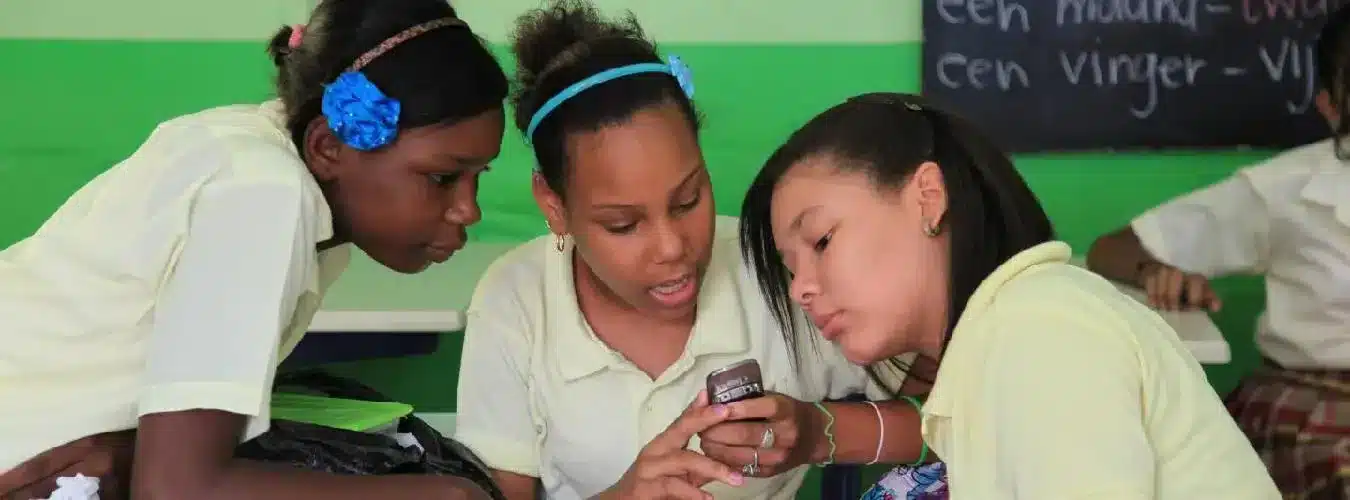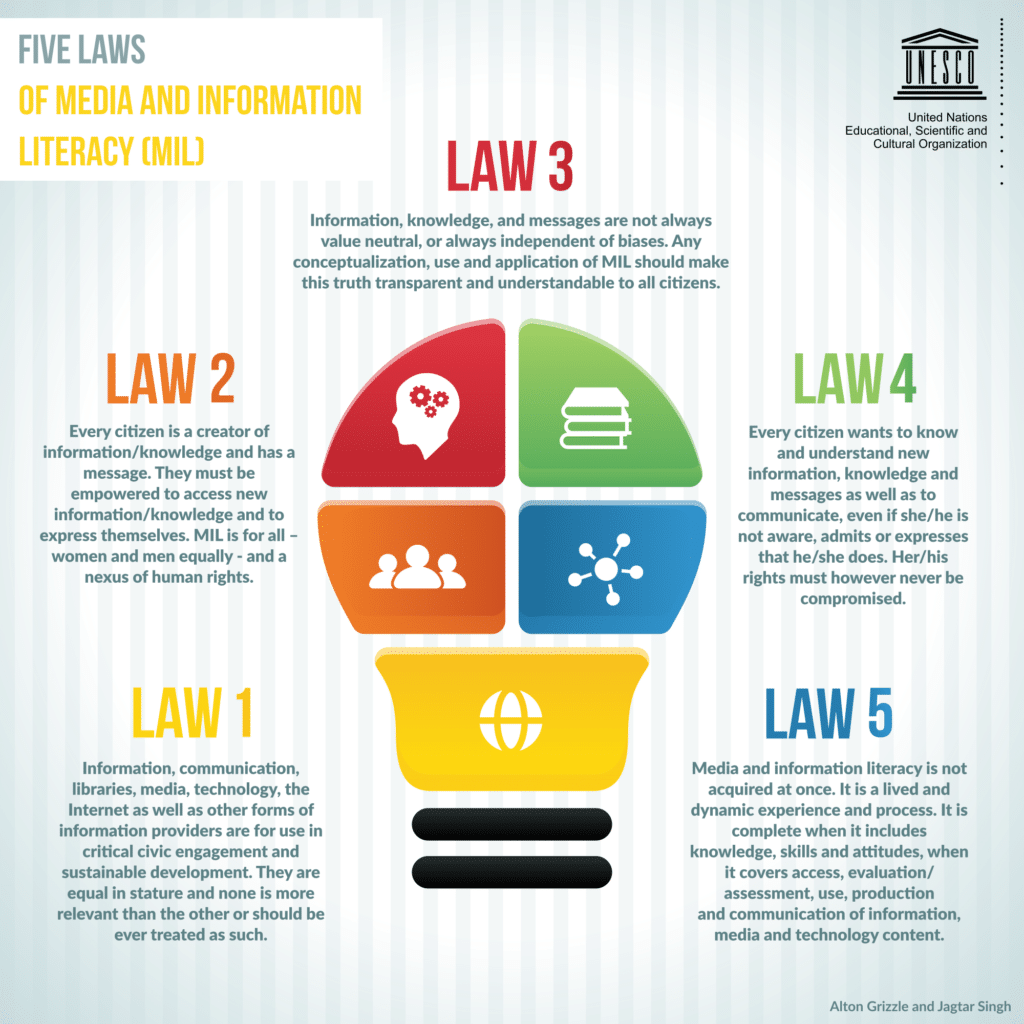Global Media and Information Literacy Week 2024: Theme, History, and Significance

While access to the Internet is increasing worldwide, millions of people still lack access to quality, credible information. PHOTO: © UNICEF/UNI120076/LeMoyne
Global Media and Information Literacy Week, commemorated annually, is a major occasion for stakeholders to review and celebrate the progress achieved towards “Media and Information Literacy for All.” The observation begins on 24 October and concludes on 31 October.
The Global Media and Information Literacy (MIL) Week is a significant initiative that highlights the importance of media and information literacy in today’s interconnected world. This annual event aims to promote awareness about the crucial role of media and information literacy in fostering a better understanding of the complex information environment. It also emphasizes the need for individuals to develop critical thinking skills and become responsible consumers and producers of information.
Similar thematic days are International Day for Universal Access to Information which is observed on 28 September. World Telecommunication and Information Society Day is observed on 17 May. World Development Information Day is observed on 24 October.
History of Global Media and Information Literacy Week
The Global Media and Information Literacy (MIL) Week has its roots in the Media and Information Literacy (MIL) initiatives that began gaining traction in the early 2000s. The concept of MIL emerged in response to the rapid growth of digital media and the increasing influence of information and communication technologies on society. Recognizing the need to equip individuals with the skills to critically analyze and navigate the expanding media landscape, various international organizations and stakeholders started advocating for the integration of MIL into education and policy frameworks.
The annual Global Media and Information Literacy Week, initiated in 2012, is led by UNESCO in cooperation with the UNESCO Media and Information Literacy Alliance, the UNESCO-UNAOC Media and Information Literacy and Intercultural Dialogue (MILID) University Network, and other partners. It is a major occasion for stakeholders to review and celebrate the progress achieved toward “Media and Information Literacy for All”.
The eleventh Global Media and Information Literacy Week will be commemorated from 24 to 31 October 2022 and will be hosted by Nigeria.
The twelfth edition of the Global Media and Information Literacy Week feature conference will be co-organized by UNESCO and the Government of The Hashemite Kingdom of Jordan on 23 – 25 October 2023. However, due to the situation in the region, the Hashemite Kingdom of Jordan and UNESCO have decided to postpone the Global MIL Week 2023 Conference, planned for 23-25 October in the Dead Sea, to a future date that will be communicated at the earliest possible time.
The theme of Global Media and Information Literacy Week 2024
Global Media and Information Literacy Week, commemorated annually, is a major occasion for stakeholders to review and celebrate the progress achieved towards “Media and Information Literacy for All.”
The theme for Global Media and Information Literacy Week 2024 is “The new digital frontiers of information: Media and Information Literacy for public-interest information.” This theme highlights the importance of media and information literacy in navigating the rapidly evolving digital landscape, emphasizing the need for critical thinking skills to identify, assess, and engage with public-interest information online.
The theme of Global Media and Information Literacy Week 2023 is “Media and Information Literacy in Digital Spaces: A Collective Global Agenda” The theme of Global Media and Information Literacy Week 2022 was “Nurturing Trust: A Media and Information Literacy Imperative”
The twelfth edition of the Global Media and Information Literacy Week feature conference will be co-organized by UNESCO and the Government of The Hashemite Kingdom of Jordan on 23 – 25 October 2023. However, due to the situation in the region, the Hashemite Kingdom of Jordan and UNESCO have decided to postpone the Global MIL Week 2023 Conference, planned for 23-25 October in the Dead Sea, to a future date that will be communicated at the earliest possible time.
Significance of Global Media and Information Literacy Week
The Global Media and Information Literacy (MIL) Week holds significant importance in the contemporary digital landscape for several reasons:
- Promotion of Critical Thinking: In an era characterized by the proliferation of information sources, the Global MIL Week encourages the development of critical thinking skills. By promoting media and information literacy, the event fosters the ability to critically assess, analyze, and interpret the information available, thereby enabling individuals to make well-informed decisions.
- Empowerment in the Digital Age: With the widespread use of digital technologies and social media platforms, Global MIL Week empowers individuals to navigate the complex digital environment responsibly. It equips them with the necessary skills to discern between credible and misleading information, thus enabling them to participate actively and responsibly in the digital sphere.
- Enhancement of Democratic Participation: By promoting media and information literacy, the event contributes to the enhancement of democratic participation. It empowers individuals to engage in informed discourse, understand diverse perspectives, and make decisions that contribute to the betterment of society. In this way, it fosters a more engaged and active citizenry.
- Mitigation of Disinformation and Misleading Content: The Global MIL Week plays a crucial role in mitigating the spread of disinformation and misleading content. By promoting critical thinking and information evaluation skills, the event helps individuals recognize and counteract false information, thereby contributing to the creation of a more informed and discerning society.
- Advancement of Education and Policy: The Global MIL Week serves as a platform for advocating the integration of media and information literacy into educational curricula and policy frameworks. By emphasizing the importance of incorporating MIL in educational systems and policies, the event contributes to the development of a more informed and digitally competent generation.
- International Collaboration and Exchange: The Global MIL Week fosters international collaboration and the exchange of best practices in the field of media and information literacy. It provides a platform for stakeholders from various countries and sectors to share knowledge, experiences, and innovative approaches, thereby contributing to the global advancement of media and information literacy initiatives.
What is Media and Information Literacy?
Information is essential for the optimal functioning of our brains. Information quality has a significant impact on our perceptions, beliefs, and attitudes. Information may be obtained from other persons, the media, libraries, archives, museums, publishers, or other information providers, including those on the Internet.
Access to information and communication has increased dramatically throughout the world. Despite the fact that some people do not have access to information, others are inundated with print, broadcast, and digital media. The goal of Media and Information Literacy (MIL) is to provide answers for the questions that we all ask ourselves at some point in our lives. Is there a way to access, search, critically assess, use, and contribute content wisely both online and offline? How do we protect our rights both online and offline? How should information be accessed and used ethically? How can we utilize media and ICTs to promote equality, intercultural and interreligious dialogue, peace, freedom of expression, and access to information?
Five Laws of Media and Information Literacy
UNESCO suggests the following Five Laws of Media and Information Literacy.
Law1: Information, communication, libraries, media, technology, the Internet as well as other forms of information providers are for use in critical civic engagement and sustainable development. They are equal in stature, and none is more relevant than the other or should be ever treated as such.
Law 2: Every citizen is a creator of information/knowledge and has a message. They must be empowered to access new information/knowledge and to express themselves. MIL is for all – women and men equally – and a nexus of human rights.
Law 3: Information, knowledge, and messages are not always value-neutral, or always independent of biases. Any conceptualization, use, and application of MIL should make this truth transparent and understandable to all citizens.
Law 4: Every citizen wants to know and understand new information, knowledge, and messages as well as to communicate, even if she/he is not aware, admits or expresses that he/she does. Her/his rights must however never be compromised.
Law 5: Media and information literacy are not acquired at once. It is a lived and dynamic experience and process. It is complete when it includes knowledge, skills, and attitudes when it covers access, evaluation/assessment, use, production, and communication of information, media, and technology content.

Quick Facts about Global Media and Information Literacy
Here are quick facts about Global Media and Information.
- On average, people spend about 142 minutes on social media every day.
- As of 2021, Asia was the region with the largest number of online users – over 2.8 billion at the latest count.
- The global internet penetration rate is 62.5 percent, with Northern Europe ranking first with a 98 percent internet penetration rate among the population.
- China, India, and the United States rank ahead of all other countries in terms of internet users.
- Facebook was the first social network to surpass one billion registered accounts and currently sits at more than 2.89 billion monthly active users.
- In 2022, Social networking sites are estimated to reach 3.96 billion users and these figures are still expected to grow as mobile device usage and mobile social networks increasingly gain traction in previously underserved markets.
How to Observe Global Media and Information Literacy Week
Observing the Global Media and Information Literacy (MIL) Week provides an opportunity for individuals, organizations, and educational institutions to actively engage in activities that promote media and information literacy. Here are several ways to observe and participate in this significant event:
- Organize Workshops and Seminars: Plan and host workshops, seminars, and webinars focused on topics related to media and information literacy. These events can cover aspects such as critical thinking, digital literacy, fact-checking, and responsible consumption of media.
- Educational Campaigns: Launch educational campaigns that emphasize the importance of media and information literacy among students, educators, and the wider community. These campaigns can include the distribution of informational materials, interactive activities, and online resources that promote critical thinking and digital skills.
- Collaborate with Schools and Universities: Partner with educational institutions to integrate media and information literacy activities into their curricula. Encourage teachers and professors to incorporate lessons and discussions about media literacy, digital citizenship, and information evaluation into their classes.
- Online Awareness Campaigns: Utilize social media platforms and other digital channels to raise awareness about the importance of media and information literacy. Share informative content, infographics, and videos that highlight the significance of critical thinking and responsible information consumption in the digital age.
- Engage with Community Groups: Collaborate with local community organizations, libraries, and youth groups to organize events that promote media and information literacy. These events can include panel discussions, film screenings, and interactive activities that encourage critical thinking and responsible engagement with media content.
- Advocate for Policy Development: Advocate for the inclusion of media and information literacy in educational policies and programs at the local, national, and international levels. Engage with policymakers, educators, and relevant stakeholders to emphasize the importance of integrating media literacy education into formal learning environments.
- Promote Fact-Checking and Verification: Encourage the practice of fact-checking and verification of information among individuals and communities. Organize activities that teach participants how to identify reliable sources, verify information accuracy, and detect misleading content.
- Encourage Research and Innovation: Support research initiatives and innovative projects that explore new strategies and technologies for enhancing media and information literacy. Encourage scholars, researchers, and practitioners to contribute to the development of effective approaches for addressing contemporary challenges in the information landscape.
Observer Voice is the one stop site for National, International news, Sports, Editor’s Choice, Art/culture contents, Quotes and much more. We also cover historical contents. Historical contents includes World History, Indian History, and what happened today. The website also covers Entertainment across the India and World.

